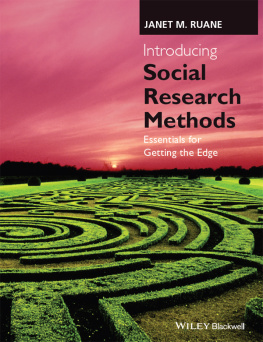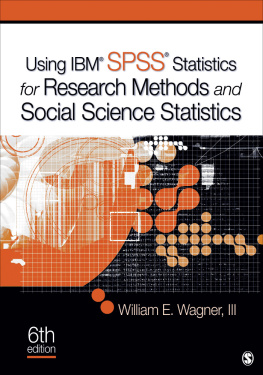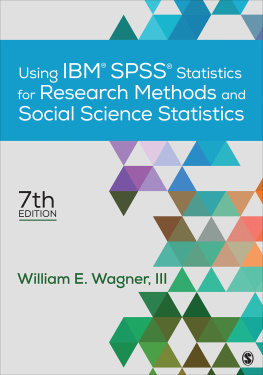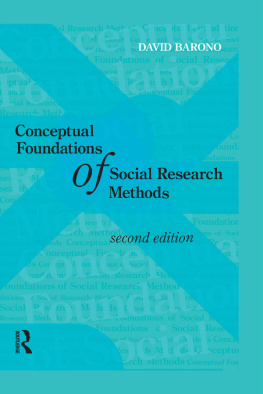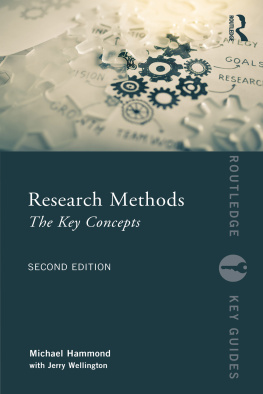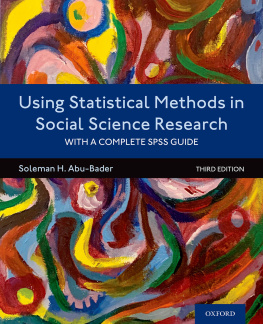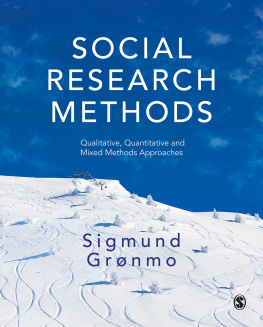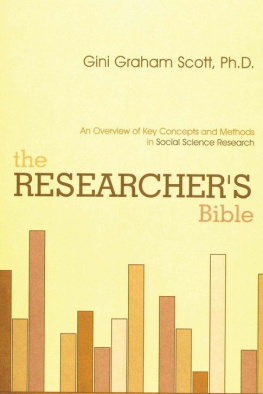
This edition first published 2016
2016 John Wiley & Sons Ltd
Registered Office
John Wiley & Sons Ltd, The Atrium, Southern Gate, Chichester, West Sussex, PO19 8SQ, UK
Editorial Offices
350 Main Street, Malden, MA 02148-5020, USA
9600 Garsington Road, Oxford, OX4 2DQ, UK
The Atrium, Southern Gate, Chichester, West Sussex, PO19 8SQ, UK
For details of our global editorial offices, for customer services, and for information about how to apply for permission to reuse the copyright material in this book please see our website at www.wiley.com/wiley-blackwell.
The right of Janet M. Ruane to be identified as the author of this work has been asserted in accordance with the UK Copyright, Designs and Patents Act 1988.
All rights reserved. No part of this publication may be reproduced, stored in a retrieval system, or transmitted, in any form or by any means, electronic, mechanical, photocopying, recording or otherwise, except as permitted by the UK Copyright, Designs and Patents Act 1988, without the prior permission of the publisher.
Wiley also publishes its books in a variety of electronic formats. Some content that appears in print may not be available in electronic books.
Designations used by companies to distinguish their products are often claimed as trademarks. All brand names and product names used in this book are trade names, service marks, trademarks or registered trademarks of their respective owners. The publisher is not associated with any product or vendor mentioned in this book.
Limit of Liability/Disclaimer of Warranty: While the publisher and author have used their best efforts in preparing this book, they make no representations or warranties with respect to the accuracy or completeness of the contents of this book and specifically disclaim any implied warranties of merchantability or fitness for a particular purpose. It is sold on the understanding that the publisher is not engaged in rendering professional services and neither the publisher nor the author shall be liable for damages arising herefrom. If professional advice or other expert assistance is required, the services of a competent professional should be sought.
Library of Congress Cataloging-in-Publication Data
Ruane, Janet M.
Introducing social research methods : essentials for getting the edge / Janet M. Ruane.
pages cm
Includes bibliographical references and index.
ISBN 978-1-118-87425-7 (cloth) ISBN 978-1-118-87424-0 (pbk.) 1. Social sciences--Methodology. I. Title.
H61.R72 2016
300.72'1dc23
2015023643
A catalogue record for this book is available from the British Library.
Cover image: Pete Turner / Getty Images
About the Website
The companion website for Introducing Social Research Methods: Essentials for Getting the Edge includes a number of resources created by the author that you will find helpful.
Please go to:
www.wiley.com\go\ruane\researchmethods
For students:
- An annotated list of TED talks on topics covered in the text
- Links to further resources available on the web
For instructors:
- A test bank with chapter-by-chapter multiple choice questions
Chapter 1
How Do We Know What We Know? Science as a Superior Way of Knowing
FIRST TAKES
Be sure to take note of the following:
Scientific vs. Non-Scientific Knowledge
- Competing non-scientific ways of knowing
- Tradition
- Authority
- Common sense
- Intuition
- Rationalism
- Strict empiricism
- Science a superior (less error prone) way of knowing
- A distinctive way of knowing
- - The defining traits of science
How do we know what we know? This is both a rather simple but also a rather complex philosophical question. Those who seek the path of least resistance are often willing to forgo the consideration of this question altogether. But in order to achieve a deeper appreciation of science and its distinctive edge in the production of knowledge, we need to take a moment and ponder this basic question. We need to explicitly acknowledge the common tendency of many to rely on competing non-scientific ways of knowing. These non-scientific ways of knowing are well established go to practices for many of us that help us cope with the dynamic nature of the social world and the flood of information we all must process every day.
To be sure, we live in an information-dominated world. Every day, like it or not, we are bombarded by facts, figures, news items, opinions, tweets, and blogs; we are connected to countless information sources about our local community, our society and our world. On any given day, Yahoo will present us with 100 or so headlines prompting us to click for more information. Many now go to bed with their electronic devices tucked under their pillows so as not to miss the latest tweets or news flashes. (Indeed sleep specialists worry that dependency on smartphones is creating vamps i.e. youth who forgo sleep and stay connected all night long.) Those same devices travel with us throughout our days so we can stay connected 24/7. If you are old-fashioned enough to get your news from a TV screen, you nonetheless understand it is not your fathers news broadcast. As any one story is being aired, texts of other headlines are continuously scrolling across the bottom of the screen. If you rely on the Internet for your daily news, you will experience countless links that can quickly bring you more in-depth or totally different information.
In recent years, our information age has taken an alluring, perhaps compelling, personal turn. To a large extent, the personal computer and the Internet allow us (even encourage us) to customize the information that comes our way. Web browsers allow us to set up personal weather forecasts, stock quote pages, or alerts for news items of special interest. We can arrange for daily emails about our favorite sports teams, current topics and celebrities. And as we all know, todays search on the Internet will deliver unsolicited ads and feeds courtesy of sites watching our every move or click.
Given all the ways of knowing that are available to us, and given our growing ability to get exactly the information that we want via cellphones and computers, students of research methods may wonder why we need to learn the methodical and labor-intensive procedures of science and research methods? Isnt all the information we need readily at our fingertips? Given the wealth of information available on the Internet, cant we be satisfied to just sit and click?
Perhaps a recent Internet banner ad for the New York Times offers the best answer to the question: Whats the point of an information age without the right information? Information is only useful if it is accurate. And if there is one hallmark of science, it is its penchant for accuracy.
The incredible amount of information that confronts us (and the relative ease of accessing it) makes us all the more vulnerable to misinformation. Indeed, Internet inaccuracies are so common there are several webpages devoted to detecting and debunking falsehoods and myths: Consider four claims that recently circulated on the Internet:
- The state of Kansas in caving to the religious right is introducing legislation to keep the newly updated science show Cosmos off Kansas television.
- Google Earth detected a British woman who was lost at sea signaling for help on a deserted island.
- The use of antiperspirants causes breast cancer.
Next page
